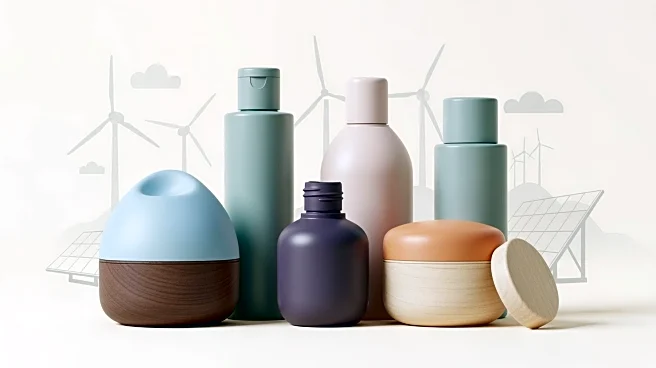What's Happening?
Coty, a major player in the beauty industry, has released its 2025 sustainability report, highlighting significant strides in environmental, social, and governance (ESG) initiatives. The company has focused on reducing its environmental impact through
various measures, including the introduction of refillable products and the reduction of packaging materials. Coty has launched refillable glass bottles and the first refillable mascara under its Max Factor brand, aiming to decrease carbon emissions and material waste. The company has also achieved a 23% reduction in packaging, surpassing its 2030 target of 20%. Additionally, Coty is working with organizations like the Sustainable Packaging Initiative for Cosmetics to overcome challenges related to sustainable materials. The report also details Coty's efforts in decarbonization, with a focus on reducing carbon emissions across its value chain and improving water management.
Why It's Important?
Coty's sustainability initiatives are significant as they reflect a growing trend in the beauty industry towards more environmentally friendly practices. By reducing packaging and introducing refillable products, Coty is addressing consumer demand for sustainable options and setting a precedent for other companies in the sector. These efforts not only help reduce the environmental footprint of beauty products but also align with global sustainability goals. The company's focus on decarbonization and water management further underscores its commitment to reducing its overall environmental impact. This shift towards sustainability can enhance Coty's brand reputation and appeal to environmentally conscious consumers, potentially leading to increased market share and profitability.
What's Next?
Coty plans to continue its sustainability journey by further reducing its carbon footprint and increasing the use of post-consumer recycled materials. The company aims to achieve a 30% use of PCR materials by 2030 and ensure that 90% of all fiber-based materials come from certified sources. Coty will also start reporting on its Carbon Kind score, a new eco-design tool, in the 2026 financial year. These ongoing efforts will likely influence industry standards and encourage other beauty companies to adopt similar practices. As Coty progresses, it may face challenges related to the availability and cost of sustainable materials, but its proactive approach and collaborations with industry initiatives position it well to overcome these obstacles.
















